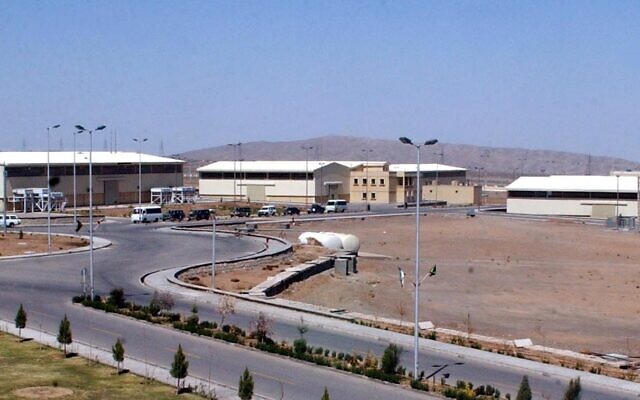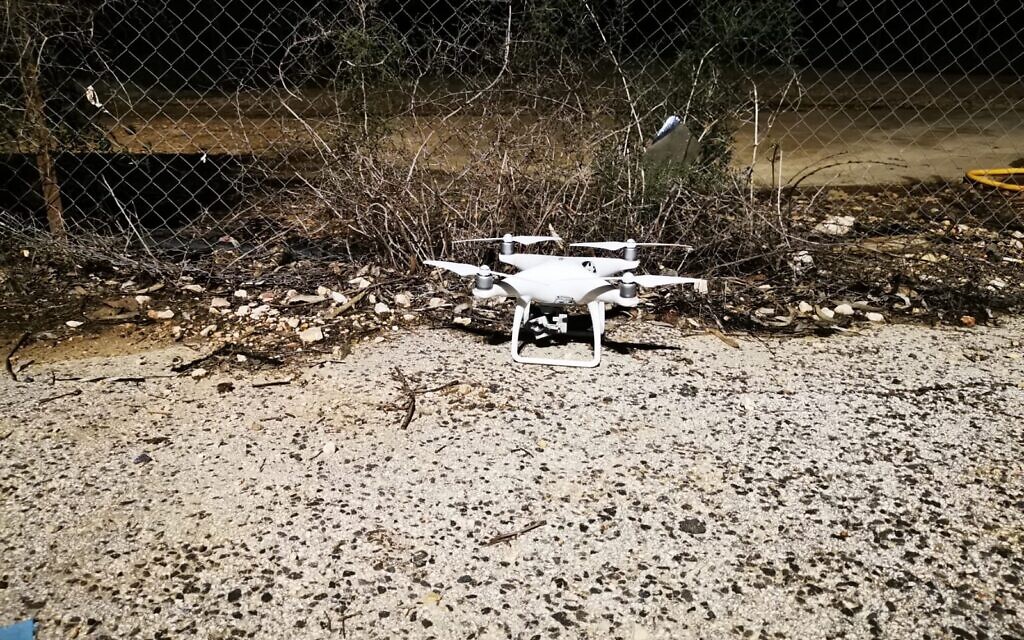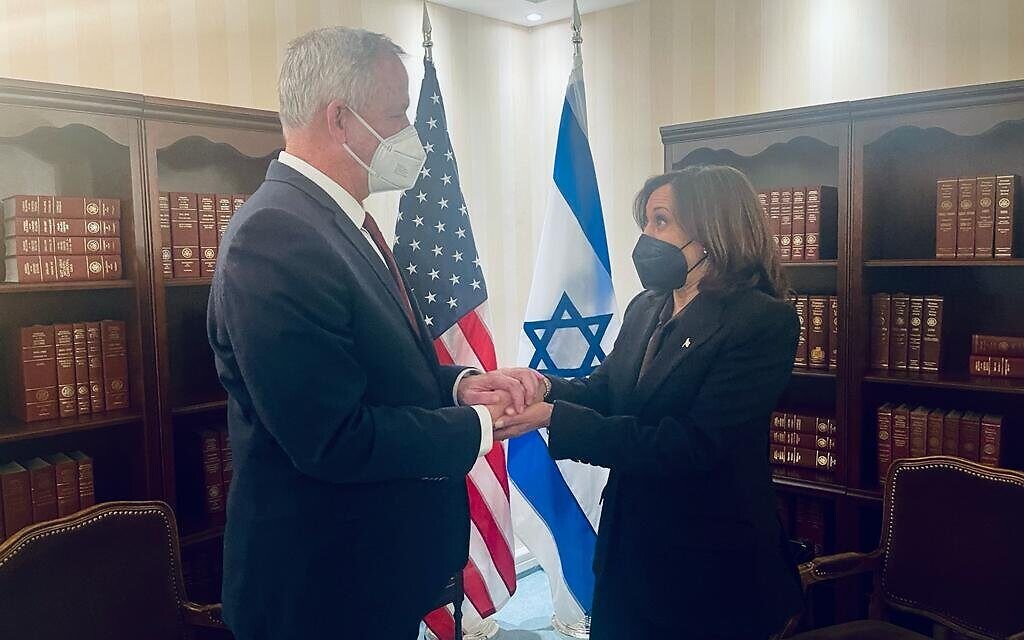Defense Minister Benny Gantz on Sunday warned of rising Iranian aggression in the Middle East as Tehran and the world powers were reportedly set to finalize a fresh agreement to curb Iran’s nuclear program in exchange for sanctions relief.
“Iranian aggression is rising — not just in the nuclear program but also in its regional attacks. Iran takes over failed states, forcing them to defend Iranian interests while committing severe human rights violations,” Gantz said, speaking at the Munich Security Conference.
The defense minister’s remarks came as American, Iranian and other international officials indicated that a renewed nuclear agreement between the world powers and Iran was imminent. Former US president Donald Trump abrogated the 2015 nuclear deal in 2018, imposing fresh sanctions on Tehran, which in turn began systematically violating the accord, formally known as the Joint Comprehensive Plan of Action.
Since US President Joe Biden’s inauguration, the US has been working — through European intermediaries — to negotiate a mutual return to the nuclear deal with Tehran, as the Iranians have regularly stalled and continued violating the 2015 deal, enriching uranium to 60% purity, improving centrifuges, and expanding and fortifying nuclear facilities.
In his speech, Gantz said any new deal with Iran must be rigorously enforced and should be built upon to ensure that Tehran never becomes a nuclear-threshold state, capable of producing a nuclear weapon quickly.
The defense minister also demanded an end to Iran’s efforts to develop nuclear-capable ballistic missiles, which was banned under the 2015 JCPOA but was not subject to the same levels of enforcement as directly nuclear-related issues.
“A nuclear deal, if signed with Iran, does not mark the end of the road. Action must be taken to ensure that Iran does not continue to enrich in additional facilities, and oversight must be increased. It is essential that the [International Atomic Energy Agency] continues to investigate and monitor open files. We must ensure that the advanced centrifuges are not found in other facilities. Development of ballistic missiles capable of carrying nuclear warheads must be stopped,” Gantz said.

The Natanz uranium enrichment facility buildings are pictured some 200 miles (322 km) south of the capital Tehran, Iran, on March 30, 2005. (AP Photo/Vahid Salemi)
The defense minister also referred to the JCPOA’s so-called “sunset clauses,” the periods of time after which Iran no longer faces sanctions for its nuclear activities. Most notably, after 2031, the JCPOA has no specific provisions to prevent Iran from producing and amassing weapons-grade uranium.
“It is critical that the sunset clause is not interpreted as an expiration date that enables Iran to revisit its nuclear ambitions. All steps must be taken to ensure that Iran never becomes a nuclear-threshold state. The world must never come to terms with it, and Israel will never come to terms with it,” Gantz said.
In addition to discussing the Iranian nuclear issue, the defense minister also warned against Tehran’s military activities throughout the Middle East, specifically its arming of proxies throughout the region, notably in Iraq and Syria. He also again accused Iran of carrying out an attack on the Israeli-owned Mercer Street cargo ship this summer with armed drones that killed two civilians, a British national and a Romanian national.

The oil tanker Mercer Street, which came under attack off Oman, is seen moored off Fujairah, United Arab Emirates on Aug. 4, 2021. (AP/Jon Gambrell)
“Iran exploits civilian flights from Tehran to Damascus International Airport to transport weapons under the illusion of civilian equipment. Iran also endangers the lives of innocent civilians by transferring weapons in containers that arrive to the port of Latakia,” Gantz said.
In December, Israel reportedly conducted airstrikes against Syria’s Latakia port twice, targeting advanced arms shipments through the terminal. After the second strike, on December 28, Gantz said Israel would “not allow Iran to stream game-changing weapons to its proxies and to threaten our citizens.”
In his speech on Sunday, Gantz accused Iran of backing armed proxies in Lebanon and “undermining the country’s governance,” in an apparent reference to the Hezbollah terror group, which has received major support from Iran in funding, weapons and training over the years.
In his speech, Gantz also issued a direct threat to Hezbollah, which flew last week two drones into Israeli airspace, one of which was brought down by the IDF while the second evaded an Iron Dome interceptor missile and returned to Lebanon.
“Just this week, in Israel we saw a number of Hezbollah attempts to violate Israel’s sovereignty. In this context, I have a clear message for Hezbollah: Their operatives are familiar with the noise made by our aircraft engines, and with their capabilities. If we are required to respond and to attack in order to defend ourselves, we will do so and we will cause great damage to the terror organization and its surroundings. The state of Lebanon will, unfortunately, have to be held responsible,” he said.
“We will not hesitate to act anytime and anywhere necessary for the security of the State of Israel,” Gantz added.

In this image, released by the military on February 17, 2022, a drone belonging to Lebanon’s Hezbollah terror group is seen after being downed by troops on the border with Lebanon. (Israel Defense Forces)
The Munich Security Conference is one of the world’s premier defense-related events, bringing speakers and representatives from all over the world.
On Saturday, Gantz met with a number of top officials from foreign governments, including US Vice President Kamala Harris.
“I expressed my gratitude to US President Biden and the VP for their commitment to preventing a nuclear Iran. I told her that any future agreement must include consistent enforcement by the IAEA in addition to handling the open files in the nuclear program,” Gantz said in a statement.
“I also thanked her for the United States’ important role in maintaining stability in the Middle East, in the face of regional aggression perpetrated by Iran and its proxies,” he said.
Earlier that day, Gantz also met with German Foreign Minister Annalena Baerbock, as well as with the Greek prime minister and defense minister; the Finnish defense minister; and Georgia’s prime minister, foreign minister and defense minister.

Defense Minister Benny Gantz meets with US Vice President Kamala Harris during the Munich Security Conference, on February 19, 2022. (Courtesy/Defense Ministry)
Gantz has previously said he was prepared to accept a scenario in which the US negotiates a fresh nuclear deal with Iran, not rejecting such a multilateral accord out of hand.
“I support an agreement that will be broader, stronger and longer — taking Iran back, dismantling its current capabilities and placing effective inspections on its sites and on its weapons production,” he said in November.
Israel staunchly and publicly opposed the original agreement, formally known as the Joint Comprehensive Plan of Action, when it was signed in 2015 by then-president US Barack Obama, with then-prime minister Benjamin Netanyahu arguing — in a blistering speech in the US Congress — that it actually paved the path to an Iranian nuclear arsenal.
The Netanyahu government later backed former US president Donald Trump’s decision to withdraw the US from the deal in 2018 and initiate a “maximum pressure” campaign against Iran, which led Tehran to ramp up its nuclear work in violation of the JCPOA.
Jacob Magid contributed to this report.